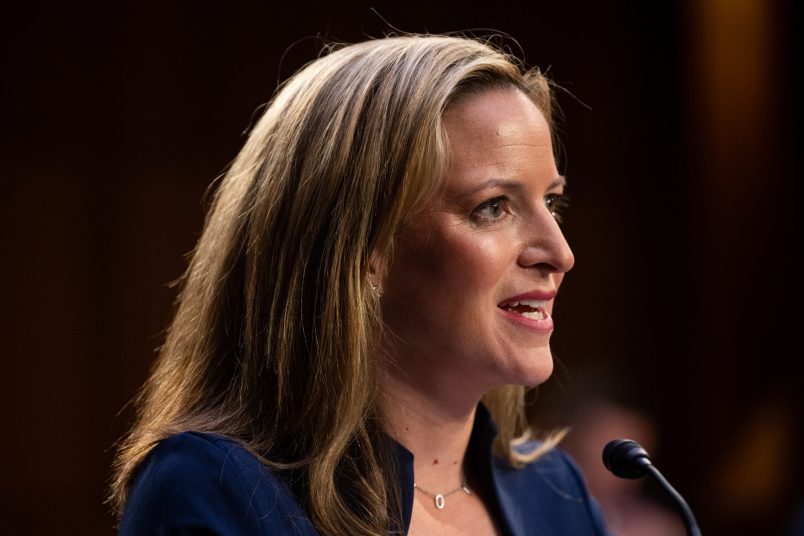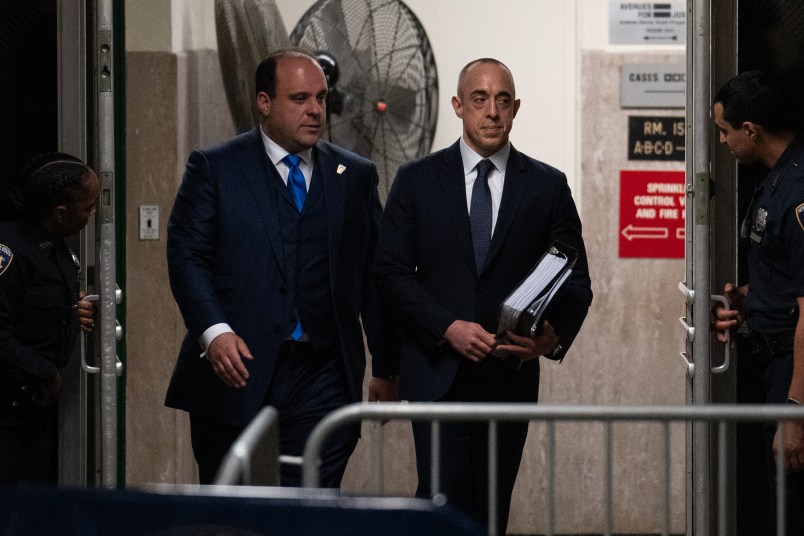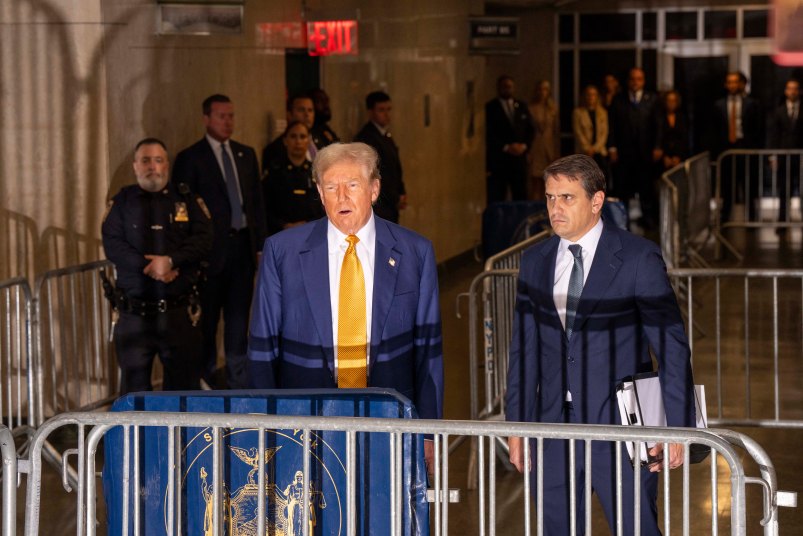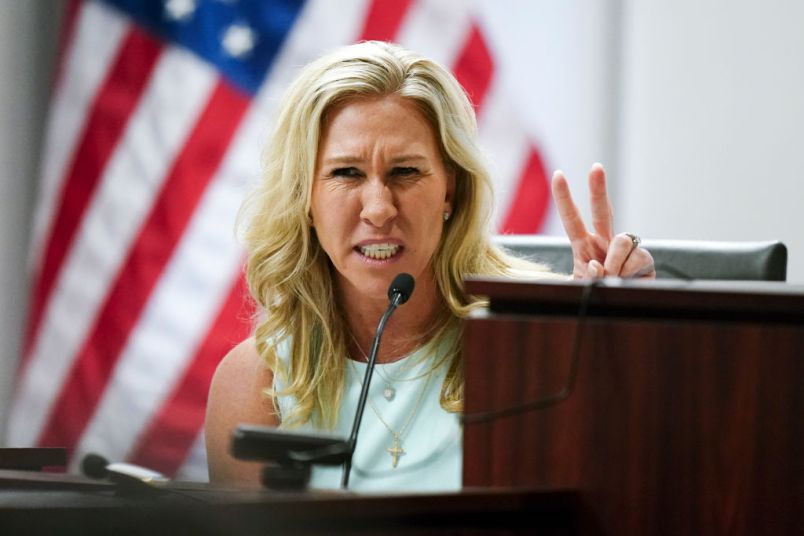As good government groups, various attorneys and some candidates around the country gear up to try to disqualify Donald Trump from running for the presidency via the Disqualification Clause, state officials are taking notice.
TPM reached out to secretaries of state and election boards for what are likely to be some of the swingiest states next year, including the states that Trump attempted to overturn in 2020.
The result was a mixed bag, with at least one secretary of state’s office — in Ohio — dismissing the efforts as a “fringe legal theory.” Others, like New Mexico’s secretary of state, expressed guarded enthusiasm for the idea.
Trump’s attempt to reverse his loss in the 2020 election, which culminated in him egging on the crowd that stormed the Capitol on Jan. 6, should disqualify him from public office under the 14th Amendment’s Disqualification Clause, good government groups Free Speech for People (FSFP) and Citizens for Responsibility and Ethics in Washington (CREW) maintain.
But to accomplish Trump’s removal from the ballot, each state has its own process, which typically involves a filing before a secretary of state’s office or election board, and then holding an evidentiary hearing to determine the result.
The secretary of state or top elections official can also initiate the proceedings on her own, a result which FSFP has tried — and thus far failed — to accomplish.
But in New Mexico, where a county commissioner who joined the mob on Jan. 6 was removed from office under the Disqualification Clause last year, the secretary of state’s office told TPM it was ready to examine it.
“We are aware of and are reviewing the legal theories regarding the 14th Amendment that conclude Donald Trump is ineligible to run for President,” Alex Curtas, a spokesman for New Mexico Secretary of State Maggie Toulouse Oliver (D), told TPM. “If Donald Trump files in New Mexico to run for President, we will make a determination at that time based on our understanding of New Mexico law and the requirements to run for office in New Mexico. Any determination about a specific candidate’s eligibility for the ballot will be made after the candidate filing day in February 2024.”
In Ohio, a one-time swing state that now has a red tint, Secretary of State Frank LaRose (R’)s office dismissed the idea as a “fringe legal theory.”
“Ohio law clearly lays out the process for a candidate to seek ballot access, and our job is to follow the law, unless a court orders us to do otherwise,” Mary Cianciolo, press secretary for LaRose’s office, told TPM. “We’re not aware of any litigation in Ohio related to this fringe legal theory, and we do not anticipate being told to deny ballot access to any candidate who complies with Ohio law.”
Some states seemed aware of the theory, though officials asserted that there have been no specific attempts to disqualify Trump that had yet come across their desk.
“There have been no specific efforts at this time,” Wisconsin Elections Commission spokesperson Joel DeSpain told TPM.
“This issue has not come before the State Board,” said Patrick Gannon, press secretary for the North Carolina Election Board. “The Board generally does not comment on legal matters that may or may not come before it.”
Many other states did not respond to or declined to comment on TPM’s questions.
CREW told TPM that it plans to file challenges to Trump’s inclusion on primary presidential ballots by the end of this year.
Ron Fein, legal director for FSFP, told TPM that his group planned on bringing challenges which were “designed to be filed and ideally resolved before the primaries.”
As the legal theory gains traction, it’s apparently become a big topic of conversation for the officials who may have to decide whether or not to give it credence.
“Secretaries of states of multiple states are having conversations,” Michigan Secretary of State Jocelyn Benson (D) said on Michigan Information and Research Service’s Monday podcast. “I’m talking with folks in Pennsylvania, with the secretary of state in Nevada and even in Maine — people in Georgia of course, my colleague Brad Raffensperger — just to get a sense of what the facts are, what the evidence is, what the timeline is, knowing there has been now and likely will be an ongoing legal question about the former president’s eligibility to be on the ballot rooted in the 14th Amendment.”
Benson added recently on MSNBC that election officials across multiple states will “likely need to act in concert, if we act at all” on the disqualification challenge.
At least one election official was outspoken in his take on the disqualification argument.
Adrian Fontes (D), the freshly elected secretary of state in Arizona, took a dim view of the previous court decision on disqualifying a raft of politicians — Reps. Andy Biggs (R-AZ), Paul Gosar (R-AZ) and former Republican secretary of state nominee Mark Finchem — in his state.
There, the trial court found that only Congress gets to determine a candidate’s qualification for a ballot — seemingly walling off the state, which already does police who can be on a ballot under other prerequisites. The state Supreme Court affirmed solely under state law, largely avoiding the constitutional questions.
“Does a 25-year-old get to be on the ballot in Arizona for president?” Fontes asked sarcastically on the Arizona Republic’s “The Gaggle” podcast. “According to the logic of the Arizona Supreme Court, they do.”
He called the reasoning “stupid,” though acknowledged that he had to follow it.
“That having been said, can the Arizona Supreme Court be overturned?” he asked rhetorically. “If somebody brings a lawsuit? Well, any law can be overturned in a judicial action. Now, I’m not inviting someone to sue me, although it probably will end up happening.”
Correction: The original version of this article said that the Arizona Supreme Court affirmed the lower court in the post-Jan. 6 disqualification cases. It upheld its granting of the motions to dismiss, but avoided ruling on the major constitutional questions.











